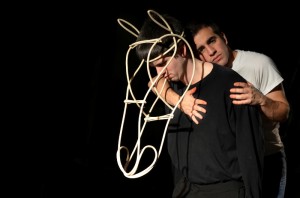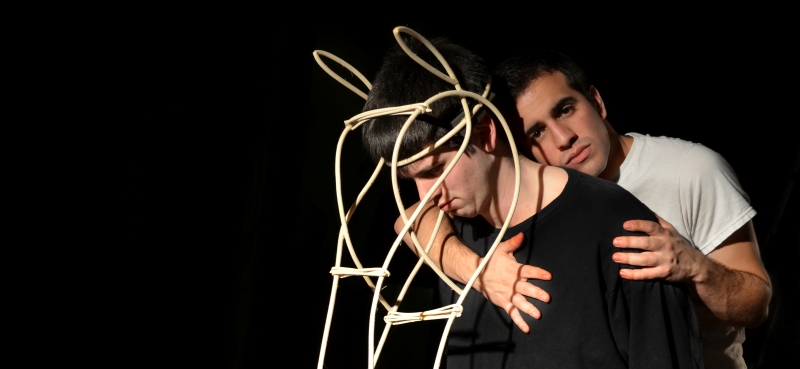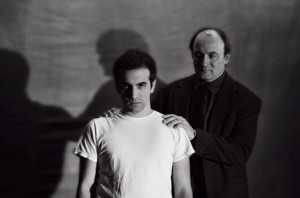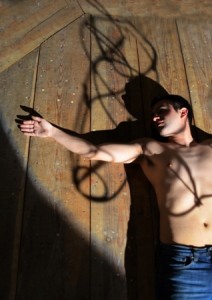“He saith among the trumpets, Ha, ha; and he smelleth the battle afar off, the thunder of the captains, and the shouting.” ~ Book of Job

Harry Slack as horse Nugget and Eric Scotolati as Alan in EQUUS at Curio Theatre Company. (Photo credit: J.R. Blackwell)
Curio Theatre Company in West Philly is reviving Peter Shaffer’s 1973 drama EQUUS for the winter season. The play centers on the explosive encounters between Alan Strang, who has blinded six horses with a spike, and Martin Dysart, the middle-aged psychiatrist who agrees to treat him. Shaffer based the plot on an allegedly true story told by a friend about a young man who blinded a stable of horses. He wrote EQUUS to “create a mental world in which the deed could be made comprehensible.”
EQUUS is a challenging play that requires the audience to really think—it is not escapist fare. Though written forty years ago, it is not at all dated. And the questions the story poses are still quite valid. It is a tale of a young man who conflates religion, horses and sex as the result of a rather repressed upbringing. In EQUUS, the characters, as well as audiences, face a bewildering range of explanations for Alan’s mental state. Hesther Salomon, the magistrate who refers Alan to Dysart, sees Alan as a victim in pain and relies on psychiatry to relieve that pain. Alan’s parents, Frank and Dora, blame each other. It is Dora’s contention that Alan’s “illness” is an intrinsic part of his selfhood—that it’s just who he is. This disturbing possibility throws Dysart’s view of the world into confusion.
As audience members enter Curio’s playing space in the Calvary Center, they are immediately put into the central locale of the story.The theatre is configured in the round and the audience is seated in what feel like stall areas. It’s another evocative scenic design created by Paul Kuhn—nicely lit by Tim Martin. Director Liz Carlson has created a full theatrical experience. Her pace is strong, never lagging and the work of the ensemble unfolds the story wonderfully. One can see a solid hand at the helm.
The entire ensemble is onstage throughout the performance, serving as a Greek chorus and providing some very effective sound effects—part of Patrick Lamborn’s solid sound design. Curio’s Artistic Director Paul Kuhn appears as Dysart, a man going through a crisis regarding his profession. He continually questions the point of what he does, and whether he is really helping people. [In an interview prior to the 2007 revival in London, Shaffer insisted that he’s not attacking the psychiatric profession in EQUUS; he’s merely questioning what he sees as its assumption of infallibility.]
It’s hard to decide if EQUUS is a psychological thriller or a mystery. You know who committed the horrible act, but you don’t know why. And that is the quest of the play. In the end, Dysart seems to be successful at making Alan “normal,’ but he questions at what cost. Kuhn brings a genuine balance of authority and compassion to the role and pulls the audience into the story.
Eric Scotolati takes on the difficult role of Alan Strang—a character that could easily be hated by audiences. At times annoyingly petulant, then achingly insecure and frightened, it is an exceedingly complex part. Scotolati captures Alan’s early sullenness quite nicely, and gradually shows us the confused boy who got conflicting messages from his parents. It is a difficult emotional journey that the character goes through, and Scotolati handles it beautifully.
Aetna Gallagher and Ken Opdenaker portray Alan’s parents. They are very much products of English society in the early 70s. Gallagher’s solid as the overly religious woman who feels that the devil came and possessed her son. Opdenaker matches her as the taciturn, super strict father who is an atheist and tried to countermand his wife’s teachings. Seeing them so badly parent their son aids in the audience’s ultimate compassion for Alan.
Rounding out the ensemble are Trice Baldwin as Alan’s attorney Hesther Salomon, Terry Brennan as the owner of the stable, Isa St Clair as Jill—the young girl Alan has a crush on and Harry Slack as Nugget, Alan’s favourite horse. All provide strong work, adding immeasurably to the production. Their choral work was wonderfully executed and the movement provided by Colleen Hughes very inventive and well performed. Ms. Gallagher has created greatly effective costumes for all—including the horse heads worn periodically.
The echo that is ever present in the converted sanctuary aided the eeriness of the sound effects, but created challenges for hearing the dialogue clearly on occasion. I found it difficult a number of times—especially when the actors had their backs to me. I don’t know how the company can overcome this issue. That is my only quibble with the entire production. I was fully engaged throughout the performance. I must warn theatregoers that this is most definitely a show for adults. Not only is the subject matter complex—something children would not understand, and perhaps find upsetting—there is also nudity in the final fifteen minutes of the performance. It is handled quite well—I applaud Mr. Scotolati’s bravery—but I don’t think it’s something for anyone under the age of 18.
If you are an adult looking for a very well-acted, thought-provoking production, I highly recommend you head to Curio.
EQUUS
by Peter Shaffer
Directed by Liz Carlson
January 23—February 16, 2013
Curio Theatre Company
4740 Baltimore Avenue
Philadelphia, Pa 19143
215-525-1350
www.curiotheatre.org




